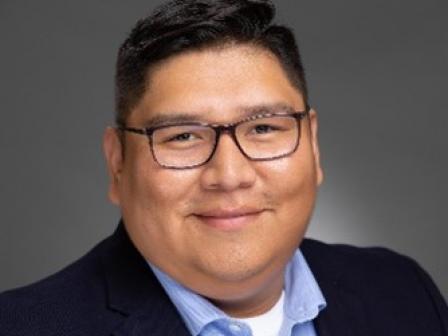
Spotlight | EDA’s First Tribal Economic Development Representative Ernest Weston, Jr. is Building Stronger Relationships With Our Tribal Communities
Ernest Weston, Jr. is the Tribal Economic Development Representative (EDR) in the Denver Regional Office, the first Tribal specific EDR role within EDA. He came to EDA in 2021, at a time of historic funding opportunities made available through the American Rescue Plan. A key component of that is the Indigenous Communities program, which allocated $100 million specifically in grants to Indian country.
“I wanted to be a part of this historic time and put my skills to use by helping EDA build a stronger relationship with our Tribal stakeholders and partners,” Weston said. “I truly believe in public service to our communities and future generations, and I felt that this was an avenue to do so.”
Weston represents EDA to over 34 Tribal nations spanning ten western states. He is currently conducting outreach to many of those nations unfamiliar with EDA, its mission and its programs. It is that aspect of his position that he finds most rewarding, as he enjoys connecting with people and communities and listening to their stories.
“Doing outreach to Tribal communities has been most empowering. I get to hear what’s on the ground and see the impact that EDA funding has on Tribal communities firsthand. That’s the most rewarding part of this role that I’m in. I get to be a conduit for our Tribal communities and EDA.”
And the tribes have spoken. A common theme among Tribal nations is one of access to EDA funding, which varies across Indian country. Denver has some of the largest land-based Tribal Nations of any EDA region, which are home to some of the poorest counties. Tribal Nations often find economic opportunities much more plentiful in suburban metropolitan areas. The other side of that coin, according to Weston, is the resiliency he sees among Tribal nations.
“I’m blown away at how folks think outside the box to meet goals and objectives. I’m taken aback by the drive our Tribal communities have.”
The Indigenous Communities program was designed to provide that access to Tribal communities and to support the needs of Tribal governments as they work to recover from the economic impact of the coronavirus pandemic. When the application process came to a close, more than one third were from the Denver region, highlighting its need for Tribal economic development.
In addition, EDA recently updated its regulations to make funding more accessible to Tribal nations, extending eligibility to include for-profit entities that are wholly owned by and established for the benefit of a Tribe and its members.
“I’m hearing positive things from Tribes that have these entities. It is now much easier for them to apply and it has generated positive outcomes and economic opportunity that directly benefits the Tribe.”
When not on the road, Weston meets with Tribal representatives virtually, giving them a space to discuss their need and issues. He recently helped the regional team initiate a Tribal coffee hour for just that purpose, fostering a sense of community among Tribal grantees as well. The group meets on the first Wednesday of every month, creating a support network while fostering opportunities for Inter-Tribal commerce. According to Weston, attendees are excited to provide updates on the status of their projects.
When not at work, Weston enjoys spending time with his family at their home on the Pine Ridge Indian Reservation in the town of Pine Ridge. It’s close to where he grew up in the nearby Porcupine District, as a member of the Brotherhood Community. He also loves the outdoors and spending time with a good book.
“If I get the opportunity to spend time doing projects or chores outside, I take that opportunity. I love to read and enjoy a good insightful or thought-provoking book that allows me to keep my mind sharp.”
For more information on the Indigenous Communities program, please visit eda.gov.
